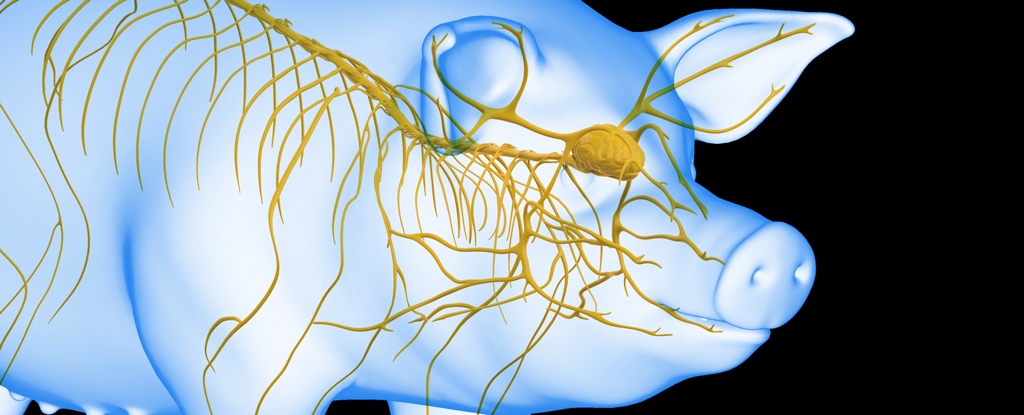In an extraordinary breakthrough in the field of medical science, researchers have revived the brain of a pig nearly an hour after the animal was declared dead. This unprecedented achievement opens up new frontiers in our understanding of brain functionality and has significant implications for various medical applications, including the treatment of neurological disorders and organ transplantation.
The Experiment: Understanding the Revival Process
The research, conducted by a multidisciplinary team, involved sophisticated techniques to restore cellular activity in the pig’s brain. After the animal was euthanized and confirmed dead, scientists employed a method called brain perfusion. This process involved using a specialized system to pump a synthetic solution into the brain, simulating blood flow and providing necessary nutrients and oxygen.
The researchers utilized a unique formulation that included various compounds designed to promote cellular health and prevent damage during the revival process. Once the perfusion system was activated, it led to observable changes in the brain’s electrical activity, indicating that some neural functions were being restored. This revival did not mean that the brain regained consciousness or awareness; instead, it highlighted the brain’s capacity for cellular activity even after traditional death has occurred.
Implications for Medical Science
1. Rethinking Death and Brain Function
The revival of the pig’s brain prompts critical questions regarding the definitions of life and death. Traditionally, death has been defined by the cessation of brain activity; however, this research challenges that notion. The revival indicates that certain brain cells can remain functional longer than previously understood. This finding may force a reevaluation of what constitutes brain death and could have profound ethical implications in medical practices, particularly in organ donation and end-of-life care.
2. Applications in Neurobiology
The potential applications of this research extend far beyond the initial experiment. Understanding the mechanisms that allow brain cells to survive and regain function after being deprived of oxygen could lead to new treatments for various neurological conditions. For instance, patients suffering from stroke, traumatic brain injuries, or neurodegenerative diseases like Alzheimer’s may benefit from therapies that enhance brain recovery after damage.
Researchers could explore ways to stimulate cellular activity in affected areas of the brain, potentially improving patient outcomes. Moreover, studying how brain cells respond to revival techniques may lead to breakthroughs in regenerative medicine, offering hope to those suffering from currently untreatable conditions.
3. Organ Transplantation
One of the most pressing challenges in modern medicine is the shortage of available organs for transplantation. The ability to restore function in organs, including the brain, could change the landscape of organ donation. If researchers can find ways to keep organs viable for longer periods after death, it may increase the number of viable organs for transplant.
The research also raises questions about the ethical implications of extending life or organ viability. As we venture into a new era of medical possibilities, society must grapple with the moral considerations of using such technologies, especially concerning consent and the treatment of living beings.
Ethical Considerations
As with any significant advancement in medical science, ethical concerns accompany the revival of a pig’s brain. The implications of such technology must be carefully considered. Some key ethical questions include:
1. Consent and Animal Welfare
While the study focused on a pig, the revival of any animal’s brain raises issues related to consent and welfare. Ethical treatment of animals in research is paramount, and scientists must ensure that such studies are conducted with the utmost care and respect for the subjects involved.
2. The Definition of Life
The revival of brain function challenges our understanding of life and death. If brain cells can be revived after a significant period of death, it raises questions about when life truly ends. This uncertainty can complicate decisions related to organ donation, end-of-life care, and the rights of patients and families.
3. Future Implications for Humans
The technology used in this research may eventually be applied to human medicine, which brings additional ethical considerations. For instance, if brain revival techniques were to become viable for human patients, how would society regulate their use? What protocols would be necessary to ensure ethical applications in clinical settings?
Future Research Directions
The successful revival of the pig’s brain is just the beginning. Researchers are eager to explore various avenues for further investigation:
1. Expanding the Research
Future studies will likely focus on a broader range of animal models to understand the mechanisms behind brain revival better. By examining different species, researchers can assess whether the findings apply universally or are specific to pigs.
2. Investigating Cellular Mechanisms
Understanding the biochemical processes that allow brain cells to function after death will be critical for developing practical applications. Researchers may study the cellular pathways involved in energy metabolism, neuroprotection, and recovery.
3. Translating Findings to Human Medicine
As researchers gain insights into brain function restoration, they will explore how these findings can be translated into human medicine. Clinical trials may be necessary to determine the safety and efficacy of any potential treatments derived from this research.
4. Developing Ethical Guidelines
Given the ethical implications of this research, developing guidelines and frameworks for responsible use will be essential. Engaging with ethicists, medical professionals, and the public will ensure that the technology is used ethically and responsibly.
Conclusion
The revival of a pig’s brain nearly an hour after death marks a monumental breakthrough in medical science. This research not only expands our understanding of brain functionality but also raises critical ethical and philosophical questions about life and death. As researchers continue to explore the implications of this groundbreaking work, society must engage in meaningful conversations about the ethical use of such technologies in medicine.
The future of medical science holds immense potential, and the ability to restore brain function may lead to unprecedented advancements in treating neurological conditions, improving organ donation practices, and challenging our perceptions of life and death. As we stand on the brink of a new era in medical research, the possibilities are both exciting and profound.

